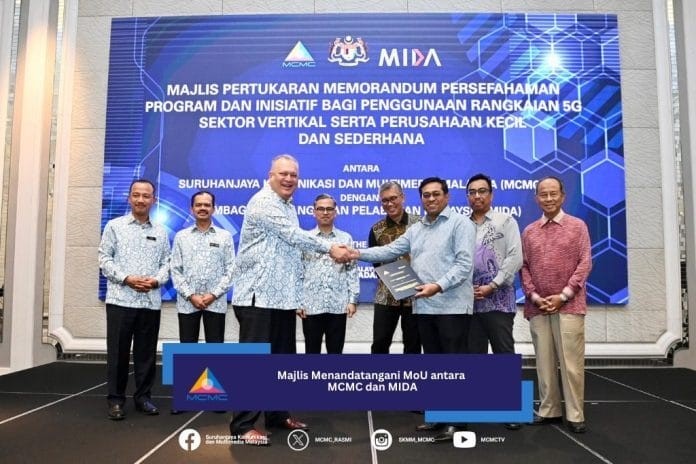
A significant MOU signed today establishes a ground to strengthen 5G technology aimed at propelling Malaysia’s industries towards technological advancement, sustainability, and greater integration into the global value chain.
Minister of Communications Fahmi Fadzil said the Memorandum Of Understanding (MOU) signed between The Malaysian Communications And Multimedia Commission (MCMC) and the Malaysia Investment Development Authority (MIDA) will undertake programmes and initiatives aimed at leveraging the use of 5G networks in vertical sectors and small and medium enterprises (SMEs).
“This also supports the objectives of the New Industrial Master Plan (NIMP 2030), which outlines four missions including advancing economic complexity, accelerating digitalisation, promoting net-zero carbon emissions, and ensuring economic security and inclusivity,” he said at the event in Kuala Lumpur today.
Fahmi explained that the MoU also outlines the intention to provide access to 5G technology and infrastructure for relevant sectors moving towards digitalisation.
“MCMC will provide technical support and training to prepare for 5G integration, emphasising the importance of leveraging 5G technological advancements for the involved industries. What we are witnessing today is not merely technological progress but also a glimpse into the future of innovation, connectivity, and socio-economic development, he said.
The sustainability and ability to adapt to current trends require contributions and expertise from various stakeholders. Therefore, collaboration between government agencies, industry players, and stakeholders is crucial.
Fahmi added the forthcoming collaboration between MCMC and MIDA is evidence that a collaborative approach is the best way to drive these initiatives forward. This approach will ensure faster and more efficient adoption of 5G, meeting the needs of various sectors. Through this collective effort, the government aims to unlock the full potential of 5G, drive innovation, transform industries, and shape a more connected Malaysia. The government looks forward to more such partnerships among related industry players to further accelerate the development of 5G in the country.
As of May 31, 2024, 5G coverage in populated areas nationwide has reached 81.7%, with a total of 14.1 million 5G subscriptions in Malaysia during the same period. In developing the country’s digital economy, 5G can help foster entrepreneurship by empowering SMEs to expand their businesses. The development of 5G aligns with the government’s goals to achieve inclusive growth and ensure that digitalisation benefits all segments of society, he said.
The contribution of 5G to the national economy is expected to increase Gross Domestic Product (GDP) by creating new services and industries, establishing new business models, and enhancing productivity and efficiency across various touchpoints.
The event which was also witnessed by Investment, Trade and Industry, Minister Tengku Zafrul Abdul Aziz, who said the strategic cooperation between MITI and MIDA is aligned with the aspirations of the MADANI Economy and represents a crucial step towards realizing Malaysia’s goal of digital economy contributing 25.5% to Gross Domestic Product (GDP) by 2025.
With the MoU, MIDA and MCMC will strengthen collaboration in efforts to promote and accelerate the adoption and use of 5G technology, particularly in the manufacturing and services sectors in Malaysia.
“The MADANI Economy aims for Malaysia to be among the top 12 competitive nations by 2033. One of the key ways to achieve this goal is through the New Industrial Master Plan 2030 (NIMP 2030), especially under the mission “Tech Up for a Digitally Vibrant Nation” – emphasizing the importance of adapting digital technology to establish 3,000 smart factories in the country by 2030.
“These smart factories are expected to contribute nearly RM40 billion (RM36.8 billion) to GDP and create over 150,000 high-skilled jobs in fields such as data analytics, AI, and IoT industries. Moreover, these smart factories will drive technological innovation in the manufacturing sector, making Malaysia more competitive globally,” Zafrul said.
The digital transformation of the manufacturing and services sectors needs to be grounded in advancements in current fields including robotics autonomy, big data, augmented reality, cloud computing, internet-of-things, 3D printing, cybersecurity, simulation, and digital system integration. For the implementation of these technologies by industrial and service sectors, 5G technology is a crucial enabler, or game changer, providing higher internet speeds and reliability. In short, the use of 5G technology will enable industries to fully embrace new technological intelligence more effectively, Zafrul said.
“This capability will stimulate economic growth, create new opportunities across various sectors, and generate high-skilled digital-oriented jobs, contributing to a more dynamic and resilient economy. As a critical enabler, the connectivity of 5G technology for industrial purposes requires high-speed internet networks, low latency, and reliability. Therefore, we are committed to creating a conducive environment for the use of 5G technology, especially in industrial areas. This will not only enhance productivity and efficiency in the manufacturing and services sectors but will also attract more high-tech foreign and local companies to invest and continue investing in Malaysia,” Zafrul said.
He added, in the first quarter of 2024, Malaysia recorded approved investments amounting to RM83.7 billion in the manufacturing, services, and primary sectors, a 13% year-on-year increase compared to the first quarter of last year. Additionally, the Digital Investment Office (DIO), a collaboration between MIDA and MDEC, has approved nearly RM162 billion in digital investments from 2021 to March 2024. Most of these digital investments, along with the development of smart factories, require Industrial Grade 5G Private Networks to meet the requirements of robust and reliable connectivity.
The whole-of-nation approach involving the Ministry of Communications (KKOM), MITI, MCMC, and MIDA is key to developing a resilient industrial ecosystem equipped with world-class digital and 5G infrastructure, Zafrul added.
Source: https://www.businesstoday.com.my/2024/07/04/mcmc-mida-mou-to-leverage-5g-networks-in-vertical-sectors-malaysian-smes/

